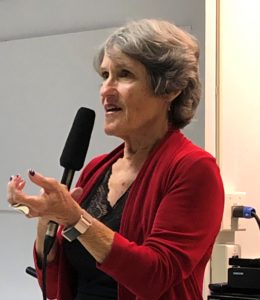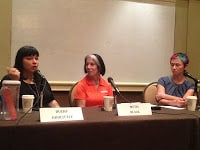Posts Tagged ‘sexual empowerment’
Do you have an Advance Directive for Sexual Rights?
This important topic comes up so often when I speak or give interviews that I’m republishing this post from Oct. 2017. Please comment!
When do we lose the right to sexual expression? If we’re lucky enough to be active and independent now, we’re smart enough to realize that a time may come that we no longer can live on our own. What will you want for yourself? For your loved ones? How can you make sure that your wishes are respected?
Take some time to think about these ideas and questions:
- When do we lose the right to sexual expression?
- Does our right to sexual expression end if/when we can no longer live independently? If so, why?
- Who determines whether we can still express ourselves sexually, and by what guidelines do they make that decision?
- Do elders with dementia have the right to sexual expression? Who decides that, and on what basis?
- If staff members have a different personal belief about what’s appropriate sexual behavior (or non-behavior), do their values override our own?
- If family members are uncomfortable with us having a sexual relationship, should their wishes supersede ours?
Personally, I want the right to decide when and how I want to be touched sexually — whether by my own hand, a partner I’ve chosen, or a sex toy that they’d better not pry out of my arthritic hands — for the rest of my life. Don’t you?
If I end up living in a care facility, I imagine I won’t submit to rules easily, unless they are as progressive as the Hebrew Home at Riverdale (NY), which has had a sexual rights policy since 1995, and updates it periodically. Until other homes catch up, it’s up to us to make our wishes clear.
Have you written your Advance Directive for Sexual Rights? Here’s mine:
- Make sure I have an outlet and batteries to keep my sex toys in working order.
- Do not interfere with any warm connection I may be enjoying with any companion I choose, in any way I choose to express that connection.
- If I’m involved with a sexual partner, make sure I have easy access to safer sex protection.
- When I close the door—whether I’m alone or with another person—give me privacy.
- If I’m still capable of sharing information about senior sexuality with residents and or staff, provide me with opportunities to do that.
What are yours?
 [Excerpted from The Ultimate Guide to Sex after Fifty: How to Maintain – or Regain – a Spicy, Satisfying Sex Life by Joan Price]
[Excerpted from The Ultimate Guide to Sex after Fifty: How to Maintain – or Regain – a Spicy, Satisfying Sex Life by Joan Price]
CatalystCon: celebrating sexuality
I’m basking in the joy of CatalystCon, a weekend of learning and sharing with other sex educators and self-proclaimed sex geeks. The mission of this event was “Sparking Communication in sexuality, activism and acceptance.” Oh yes, mission accomplished.
Though most attendees were younger and I was the only speaker on senior sex, there were other people with grey hair (or they would have had grey hair had they not colored theirs). I felt total acceptance from all the people I met, even those decades younger. The sex-positive nature of the event conveyed this message to everyone: “I celebrate my own sexuality, sexuality in general, and your sexuality, no matter how different from mine yours might appear to be.”
| Megan Andelloux |
I tried to choose from 40 sessions presented over two days, wishing I could attend them all. For every session I attended, there were four I had to miss.
| Charlie Glickman |
Some of my favorite sex educators featured in Naked at Our Age were speaking: Carol Queen, Charlie Glickman, Megan Andelloux. There were names that inspire recognition and awe, such as Dr. Marty Klein.
(Want your own “Sex Geek” shirt? Order from Reid Mihalko here.)
I attended sessions where I’d learn information that you, dear sex-positive senior readers, would benefit from knowing, and others where I’d come away with plenty of “huh! I didn’t know that!”
For example, the “Toxic Toys” session with Metis Black, founder of Tantus, high quality silicone sex toys; Jennifer
Pritchett, founder of Smitten Kitten; and feisty educator and author, Ducky Doolittle. I was amazed by their stories of activism in an industry where sex toys used to be cheap, easily broken, and made of noxious materials that leached chemicals into our mucous membranes. We have women like these three activists to thank for the safety and quality of sex toys today.
 One of the most memorable speakers I heard was Buck Angel. Buck calls himself “a man with a vagina” — he’s a transgender man who elected to have top surgery but not bottom surgery.
One of the most memorable speakers I heard was Buck Angel. Buck calls himself “a man with a vagina” — he’s a transgender man who elected to have top surgery but not bottom surgery.
As a child named Susan (but everyone called him Buck), he was a “total tomboy” and thought of himself as a boy. “Occasionally someone would say, ‘You’re a girl,” and I’d beat the crap out of them, and they’d say, ‘OK, you’re a dude,’” he says. “Everything was fine until at 15, puberty hit. Not puberty as a boy – but puberty as a girl. Here I am bleeding, my boobs are growing, I’m turning into a woman.”
He had his sex change 20 years ago, before female-to-male changes were done. He was the “guinea pig” for the surgeon who removed his breasts. “For years I hated what I was, and now I love it,” he says.
Now Buck is 50 years old, a porn star (“the man with a pussy”), transgender activist, and motivational speaker. His past includes alcohol and drug addiction, modeling, hustling, attempted suicide, and death threats. “I should be dead,” he says. “Why am I still here? Because I have a message to give the world: Deprogram yourself, and love your vagina.” Buck Angel’s story is worthy of a book. (Buck, do you need a ghostwriter?)
 |
| Carol Queen & Robert Lawrence |
Another provocative session was “Why Talk about Sex and Disability?“, co-presented by Robin Mandell and Dr. Robert Morgan Lawrence (who also gave a fascinating talk on “The Anatomy of Pleasure” with his partner Carol Queen).
| Robin Mandell |
Robin referred to people without disabilities as “temporarily able-bodied” and made the point that we have much to learn from sex-positive people with disabilities. Robert, who referred to himself as “old and crunchy,” jolted us all when he spread out all the medications he has to take for myriad medical challenges including pain that limits mobility. He has had to make many accommodations sexually as well as in other ways. “It took being crippled to realize that sex wasn’t penetration,” he says.”
I had fun at a workshop learning to use the new version of the female condom, called the FC2. If your experience was with the first female condom, which felt and sounded like having sex with a shower curtain, you’ll be happy to know the material is completely different now. It’s great for folks of our age, because the penis can be inserted even if it’s not erect, and lube in the condom doesn’t dry up or get absorbed.It can also be used for anal sex for either gender, just remove the inner ring. One man in the workshop said it was a way “to feel bareback sensations while staying protected.” (This video shows how to insert it and gives lots of info.)
Okay, the female condom does look funny (especially in this model with a dildo in it that we passed around — should I not have shared this?), but the workshop leaders, Planned Parenthood sex educators Alma de Anda and Mayra Lizzette Yñiguez, advised us to give it three tries to discover how comfortable and empowering it is. They gave me a bunch of samples (three in a pack, to prove their point) to share with my workshop attendees!
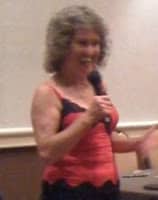
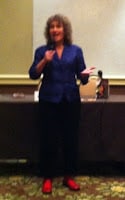 My own session was titled “Senior Sex Out Loud,” the story of my journey from high school English teacher to fitness professional/ health writer to sex educator/ senior sex advocate, with experiences along the way that were sometimes amusing, sometimes amazing, occasionally appalling. I started out wearing a jacket, but shed it when I talked about body acceptance. (Want to hear this speech yourself, or offer one of my workshops at your venue? I have a suitcase packed, would love to come to you. Please email me and let’s talk.)
My own session was titled “Senior Sex Out Loud,” the story of my journey from high school English teacher to fitness professional/ health writer to sex educator/ senior sex advocate, with experiences along the way that were sometimes amusing, sometimes amazing, occasionally appalling. I started out wearing a jacket, but shed it when I talked about body acceptance. (Want to hear this speech yourself, or offer one of my workshops at your venue? I have a suitcase packed, would love to come to you. Please email me and let’s talk.)
But CatalystCon was more than the knowledge, more than the networking, more than the
opportunity for me to share what I do and how I feel about it, more than
learning what other sex educators do and how they feel about it. It
felt like a brave new world was possible, one in which acceptance and
celebration reigned.
Imagine living in a society free of closed-minded people and repressive attitudes and policies, where we celebrate our similarities and our differences and are truly
kind to each other. That was in the air at CatalystCon.
I applaud Dee Dennis, who conceived and birthed CataystCon; the sponsors who made it possible and affordable; the extraordinary speakers who were willing to donate their wisdom and incur their own travel expenses; and the attendees who were eager to absorb new knowledge, communicate openly (even those who wore the “I’m shy” wristbands that Reid gave out), and take our messages home. CatalystConWest will become a yearly event, and CatalystConEast will rock your world March 15-17, 2013 in Washington, DC.
As always, I welcome your comments.
Breaking Rules at Our Age
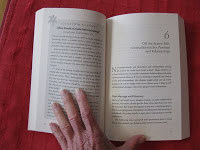 What sexual “rules” have you broken since turning 50, 60, or beyond?
What sexual “rules” have you broken since turning 50, 60, or beyond?
I ask this because I discovered from the interviews and reader stories that you’ll read in Naked at Our Age: Talking Out Loud about Senior Sex, many of us make some pretty drastic changes in our lives after age 50. Maybe we get divorced, discover love, open up our marriage, take a new lover, experiment with kink or multiple partners or virtual sex — or some combination of these or other alternatives.
The point is that although society sees us as settled into mid-life or old age, we’re far from “settled.” I think there’s something about emerging from menopause that makes us question where we want to be in our lives. Menopause often feels like an upheaval — I’ve described it before as “PMS on steroids” — where everything seems upside down. We don’t want to be responsible for remembering the whole family’s appointments, for example, and we might not be overly kind when we tell family members to take care of themselves.
After the upheaval settles, we see our lives differently. We realize that it’s now or never: it’s up to us to invent — or reinvent — what we want the rest of our lives to be, and what we have to do to actively go after our dreams.
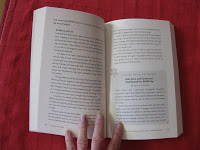 At the same time, in our sexual world, the old ways may not work any more. We may need different kinds of arousal or even a different type of relationship or a different partner. Major!
At the same time, in our sexual world, the old ways may not work any more. We may need different kinds of arousal or even a different type of relationship or a different partner. Major!
I got so many stories from my Naked at Our Age interviewees about alternative sex practices that this topic became a whole chapter: “Off the Beaten Path: Nontraditional Sex Practices and Relationships.” People wrote about swinging, polyamory, BDSM, friends with benefits, older women/younger men (20-30 years difference!), phone sex, and more.
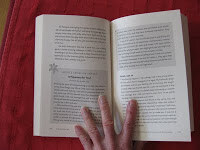 I predicted that younger readers would be shocked at what seniors are doing behind closed doors, and I should have guessed that it would shock our own age group, too. I’ve heard a couple of criticisms that this chapter and the one titled “Hiring Sensuality” (which I won’t tell you about — you have to read that one for yourself, and no, it’s not just men hiring sex!) make it sound like I’m endorsing or even pushing people towards alternative lifestyles.
I predicted that younger readers would be shocked at what seniors are doing behind closed doors, and I should have guessed that it would shock our own age group, too. I’ve heard a couple of criticisms that this chapter and the one titled “Hiring Sensuality” (which I won’t tell you about — you have to read that one for yourself, and no, it’s not just men hiring sex!) make it sound like I’m endorsing or even pushing people towards alternative lifestyles.
I’m not pushing anyone into anything. I’m showing senior sex — behaviors and attitudes — in all its colors and stripes. Personally, I support adults doing with other consenting adults whatever brings them pleasure, as long as it doesn’t hurt anyone — including the partners of those consenting adults. I have “vanilla” tastes myself, but that’s beside the point. The book is only partly about me. It’s really about you… and you… and you.
So back to my original question: What sexual “rules” have you broken since turning 50, 60, or beyond? By rules I mean society’s rules, the law, unspoken or spoken rules in a relationship, even your own rules. I’d love to see a dialogue start here. Please comment!
Learn more about Naked at Our Age: Talking Out Loud About Senior Sex here.
Tips for reclaiming sexuality after a health event
Many readers have reported concerns about how to reclaim their sexuality after a heart attack, cancer, or other health event. I asked licensed psychologist and sex therapist Stephanie Buehler, Psy.D., to provide some tips for the new book I’m writing. Her information was so valuable that I didn’t want you to have to wait for the book:
- Speak to your physician about when you can resume sex and what kinds of limitations you might expect or need to work around. If you are uncomfortable talking about it with the physician, perhaps you can bring it up to the nurse. Nurses are often interested in helping patients achieve an optimal quality of life, and are trained to educate patients as well.
- If neither your physician nor the nurse is sexually savvy, then contact whatever organization is associated with your disease. For example, both the American Heart Association and the American Cancer Society publish booklets on sexuality and illness.
- Broaden your ideas about what constitutes “sex” after an illness event. Sex is more than intercourse. Count holding hands and cuddling as sex, and you and your partner might feel less disappointed or glum.
- If you are the person affected with a health problem, don’t conclude that if your partner isn’t bringing up sex, it is no longer important. Your partner may not want to intrude or make demands and is waiting for a sign of readiness from you.
- If you are the partner of the person with a health problem, accompany your partner to a physician’s visit to discuss sexual effects of any surgery or treatment. Educate yourself so that you can be a support to your partner, and so that you and your partner can discuss how to go forward.
- If you had sexual problems before the illness event, now might be a good opportunity to address them. It may be that your health problem contributed to your sexual problem. Again, discuss this with your physician or nurse.
- If you are having trouble resuming satisfying sexual activity, consider seeing a sex therapist. A sex therapist can help you identify obstacles and give you information and suggestions. Sometimes there can be deeper problems, like facing the fact that you are not invincible, that can also be addressed with a therapist.
Stephanie Buehler, Psy.D. is a licensed psychologist and sex therapist, and Director of The Buehler Institute in Irvine, California. Visit her blog about sex and intimacy.
Note: You can locate a sex therapist in your area through AASECT, American Association of Sexuality Educators Counselors & Therapists.)
Want more ideas? Read my 7 Tips to Spice Up Your Sex Life post.
